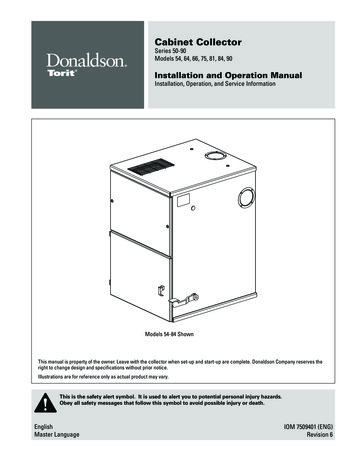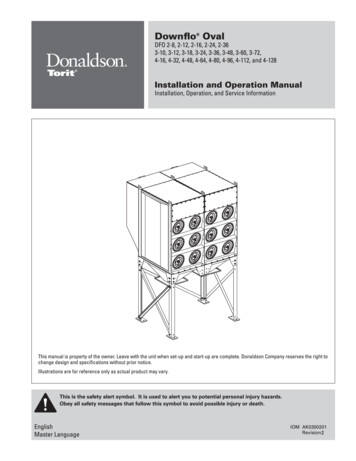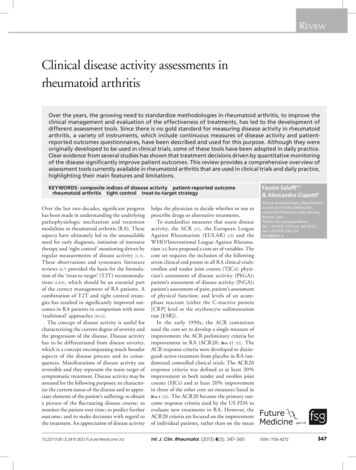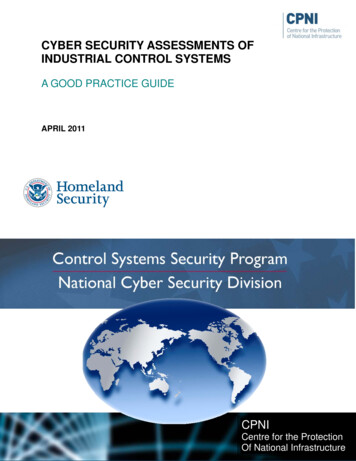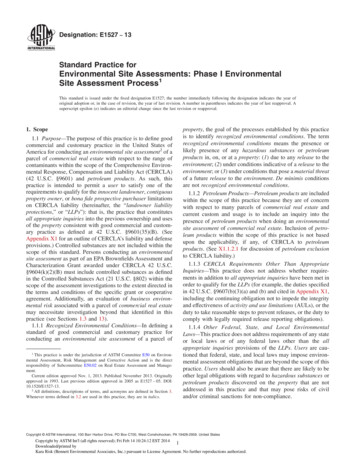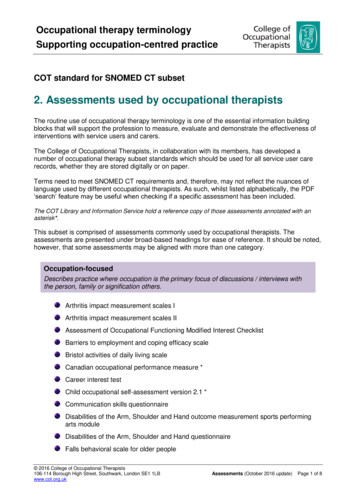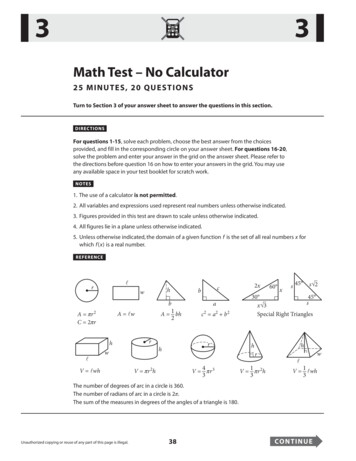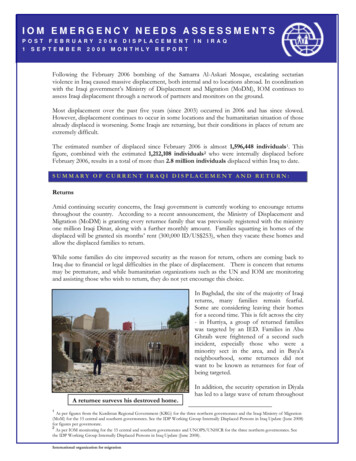
Transcription
IOM EMERGENCY NEEDS ASSESSMENTSP O S T1F E B R U ARYS E P T E M B E R2 0 0 62 0 0 8D I S P L A C E M E N TM O N T H LYI NI R A QR E P O R TFollowing the February 2006 bombing of the Samarra Al-Askari Mosque, escalating sectarianviolence in Iraq caused massive displacement, both internal and to locations abroad. In coordinationwith the Iraqi government’s Ministry of Displacement and Migration (MoDM), IOM continues toassess Iraqi displacement through a network of partners and monitors on the ground.Most displacement over the past five years (since 2003) occurred in 2006 and has since slowed.However, displacement continues to occur in some locations and the humanitarian situation of thosealready displaced is worsening. Some Iraqis are returning, but their conditions in places of return areextremely difficult.The estimated number of displaced since February 2006 is almost 1,596,448 individuals1. Thisfigure, combined with the estimated 1,212,108 individuals2 who were internally displaced beforeFebruary 2006, results in a total of more than 2.8 million individuals displaced within Iraq to date.SUMMARY OF CURRENT IRAQI DISPLACEMENT AND RETURN:ReturnsAmid continuing security concerns, the Iraqi government is currently working to encourage returnsthroughout the country. According to a recent announcement, the Ministry of Displacement andMigration (MoDM) is granting every returnee family that was previously registered with the ministryone million Iraqi Dinar, along with a further monthly amount. Families squatting in homes of thedisplaced will be granted six months’ rent (300,000 ID/US 253), when they vacate these homes andallow the displaced families to return.While some families do cite improved security as the reason for return, others are coming back toIraq due to financial or legal difficulties in the place of displacement. There is concern that returnsmay be premature, and while humanitarian organizations such as the UN and IOM are monitoringand assisting those who wish to return, they do not yet encourage this choice.In Baghdad, the site of the majority of Iraqireturns, many families remain fearful.Some are considering leaving their homesfor a second time. This is felt across the city- in Hurriya, a group of returned familieswas targeted by an IED. Families in AbuGhraib were frightened of a second suchincident, especially those who were aminority sect in the area, and in Baya’aneighbourhood, some returnees did notwant to be known as returnees for fear ofbeing targeted.A returnee surveys his destroyed home.1In addition, the security operation in Diyalahas led to a large wave of return throughoutAs per figures from the Kurdistan Regional Government (KRG) for the three northern governorates and the Iraqi Ministry of Migration(MoM) for the 15 central and southern governorates. See the IDP Working Group Internally Displaced Persons in Iraq Update (June 2008)for figures per governorate.2As per IOM monitoring for the 15 central and southern governorates and UNOPS/UNHCR for the three northern governorates. Seethe IDP Working Group Internally Displaced Persons in Iraq Update (June 2008).International organization for migration
the governorate. Monitors have identified hundreds of returnee families, and the majority of themare in need of humanitarian assistance, as their homes have been looted or destroyed.DisplacementsHundreds of families are currently being displaced in Kirkuk as a result of the ethnic tensions fuelledby the dispute over the governorate’s future. Arabs, Kurds, and Turkmen are all fleeing their homes,and they are faced with high rent prices and poor access to basic services or employment in theirplaces of displacement. In some cases families suffer continued ethnic discrimination, while othersdo not know the whereabouts of arrested family members.Evictions are a serious concern throughout the country, particularly in Baghdad. The PrimeMinister’s office has issued an eviction order for all Baghdad squatters, beginning 2 September 2008.This measure is intended to empty out occupied houses so that displaced owners of these housesmay return. Although some of these houses are illegally occupied by militant groups, a significantnumber of squatters are IDP families who could become secondarily displaced. Newly displacedfamilies will be entitled to the government rental subsidy of 300,000 Iraqi Dinar (approximatelyUS 253) for six months.In addition, it is reported that several hundred IDP families in Tikrit district of Salah al-Dingovernorate are in danger of eviction because they are squatting on land that belongs to themunicipality. The families are mostly from Kirkuk and Erbil. Another 370 families are in danger ofeviction from Al Rasheed hospital in Baghdad, and 210 families were evicted from formerintelligence headquarters in Baghdad.Returnee reports, along with IOM’s regular reporting on displacement, including governorateprofiles, biweekly updates, tent camp updates, and yearly and mid-year reviews, are available -wide Statistics:Information below is based on in-depth assessments of 189,788 families (estimated 1,138,728individuals) displaced throughout Iraq since 22 February 2006. (Please note that this figure representsthe total number that IOM monitors have assessed, not the total number of displaced in Iraq since22 February 2006.)IDP Places of Origin:BaghdadDiyalaNinewaSalah n0.22%0.14%0.07%0.03%0.02%0.01%0.01%0.01%Arab Shia Muslim56.62%Kurd Shia Muslim0.66%Arab Sunni Muslim31.04%Armenian Christian0.11%Kurd Sunni MuslimAssyrian ChristianChaldean ChristianTurkmen Shia Muslim3.70%3.04%1.87%1.28%Other ChristianArab YazidiKurd YazidiArab Christian0.06%0.05%0.05%0.03%Turkmen Sunni Muslim1.00%Arab Sabean Mandean0.02%International Organization for Migration2
How many group members have the following 0%2.20%4.20%Persons .20%6.70%2.70%0.30%0.10%0.40%0.00%GovernorateAll IraqFemale Head 0%0.00%0.90%3.80%1.70%0.10%Salah %Wassit1.40%0.00%2.10%2.30%0.20%0.00%What are the current priority needs of the group?3GovernorateAll laMissanMuthannaNajafNinewaQadissiyaSalah 8.60%This question allows multiple answers, and so rows do not have to add up to 100%, as respondents may namemore than one priority need.3International Organization for 0.70%11.60%3.60%64.00%
AnbarSecurity in Anbar remains generally stable, despite a slight increase of violent incidents this month incomparison to July. Authorities are on alert in advance of the transfer of security from MultinationalForces in Iraq (MNF-I) to Iraqi Security Forces (ISF), which is scheduled for 1st September.Displacement and return continue to fluctuate throughout the governorate. To date, monitors haveassessed 3,569 returnee families in Anbar, and 228 families returned during the month of Augustalone.Assessment based on 7,975 families.Places of y/Religion:Arab Sunni MuslimArab Shia %How many group members have the following vulnerabilities?DistrictFemale Headof HouseholdPerson WithMentalDisabilityPregnantWomenPersons %0.10%Ramadi1.10%0.20%1.50%3.80%0.10%0.30%What are the current priority needs of the group?Accessto aFoodShelterIOM emergency distribution assistance in 2007 & 2008: In 2007, IOM completed variousdistributions of food, water, and non-food items for 961 IDP families in February, 392 IDP familiesin May, 1,655 IDP families in August, and 1,344 IDP families in November. In January 2008, IOMcompleted daily water trucking benefiting nearly 36,985 vulnerable IDP and host community familiesin various locations throughout Anbar. In July, IOM has finished distributions of food and non-fooditems to 3,000 IDPs and returnees. In September the warehouse in Anbar will be closed.International Organization for Migration4Water
Babylon:Security in Babylon has calmed this month after last month’s spike in improvised explosive device(IED) explosions and militant attacks. The northern part of the governorate remains unstable withfrequent security breaches.76 IDP families living in Al Khudur have only a nearby river for a water source. There is no sewagesystem, and sludge is discharged to an open area. Approximately 100 cases of diarrhea have beenidentified, and this group has a high number of vulnerable individuals: 10 widows and 70 orphans.There is a high rate of divorce after displacement, and many of the married couples are sufferingfrom poor domestic relationships. All of the children have left both primary and secondary school,and the vast majority of the families have no income.Assessment based on 10, 271 families.Places of 14%Babylon5.96%Kerbala0.03%Salah it1.02%Ethnicity/Religion:Arab Shia MuslimArab Sunni Muslim94.34%5.39%How many group members have the following vulnerabilities?DistrictTotalAl-MahawilFemale Head ofHousehold3.10%2.60%Person 90%ElderlyPersons6.70%5.70%Persons .50%0.50%0.40%0.30%0.60%What are the current priority needs of the 0%1.90%6.40%0.00%1.80%53.20%72.70%29.20%57.80%IOM emergency distribution assistance in 2007 & 2008: July 2007, IOM completed a food andNFI distribution to 3,000 IDP and host community families in Babylon. In March 2008, IOMfinished distributing plastic sheeting for families living in substandard housing to protect from therain, benefiting 126 IDP families.Baghdad:International Organization for Migration5
Security in Baghdad continues to improve, however this month still saw some bombings and attacks,which caused both military and civilian casualties. Some returnee families in Al Hurriyaneighbourhood of Baghdad were targeted with an IED attack shortly after arriving. A mass evictionof squatters in Baghdad as of 2 September 2008 has been announced by the Prime Minster’s office.In addition, authorities in Baghdad are trying to empty the Al Rasheed military hospital complex sothat it can be rehabilitated and returned to use as a medical center. However, there are currently 370IDP families who are squatting in this complex. The prospect of eviction is a serious concern forthem, as they do not have anywhere else to go. There is a high incidence of widows and orphansamong the families, and many of them are not yet registered in MoDM and thus have not receivedany governmental assistance.210 IDP families were evicted by Iraqi military forces from Al Salam complex in Karkh district ofBaghdad, former location of Iraqi intelligence services. They were given 24 hours t
one million Iraqi Dinar, along with a further monthly amount. Families squatting in homes of the displaced will be granted six months’ rent (300,000 ID/US 253), when they vacate these homes and allow the displaced families to return. While some families do cite improved security as the reason for return, others are coming back to Iraq due to financial or legal difficulties in the place of .
